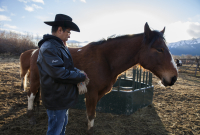Support strong Canadian climate journalism for 2025
Alberta's Lubicon Cree have been fighting for decades for a land they could call their own.
But as he's poised to finally sign the historic claim with Premier Rachel Notley, Lubicon Lake Chief Billy-Joe Laboucan said the real work is just beginning.
"It'll be a good start to what we need to do in this community," said Laboucan, who will make the deal official Tuesday.
"There's so much work to be done — the real work happens now."
The successful claim was negotiated after years of failed talks, broken promises, standoffs, arrests and global condemnation that reach back more than a century.
"So many of us have been aware of this as a very significant issue and an issue that really needed the attentions of government," said Richard Feehan, Alberta's Indigenous relations minister. "For many years, it was not happening."
In the late 1800s, British officials missed the Lubicon as they negotiated Treaty 8 with other Indigenous groups. Canada agreed the Lubicon deserved title to their land in 1939, but a deal was never reached.
The issue stagnated until the 1970s when oil and gas companies began carving through local traplines. By then, the Lubicon were so poor that diseases such as tuberculosis were a problem.
In 1988, then-chief Bernard Ominayak staged a protest at the Calgary Olympics and blockaded roads into the disputed area. The dispute went global as a United Nations committee criticized Canada for its treatment of the Lubicon.
Eventually, then-Alberta premier Don Getty set aside lands for the Lubicon under what became known as the Grimshaw Accord. Those lands are included in the current agreement.
Negotiations were rebooted in 2014 by former Alberta premier Jim Prentice, ultimately leading to last October's deal.
"The stars aligned," Feehan said. "Everybody was at the table with the absolute clear idea that we needed to come to a good place on this."
The claim offers $113 million from the provincial and federal governments as well as 246 square kilometres of land near the community of Little Buffalo. Some of that money is earmarked for roads, housing, utility services, internet and a school.
"The huge, major things are being able to get good homes in here, elders care and a future for the children here as in a good school," Laboucan said.
Laboucan said the land included in the deal has seen little industrial disturbance and is "in good shape." Laboucan said many forestry and energy companies stayed away from the area due to the vigorous campaign led by Ominayak.
"If that hadn't been the case, we wouldn't be here," said Laboucan. "A lot of credit has to go to previous chief Bernard Ominayak and council, and all the chiefs before him."
Ominayak has been invited to the ceremony, although it's not clear if he'll attend.
Laboucan said the band can finally focus on its future, not its hard-luck past.
"Up until this point, we haven't had our own land base. It's pretty hard to do what you need to do without a land base."
Feehan, who once booked Ominayak decades ago to speak at a conference he organized, said Tuesday will feel like history.
"Here we are," he said. "It feels pretty good. Very good, in fact."






Comments